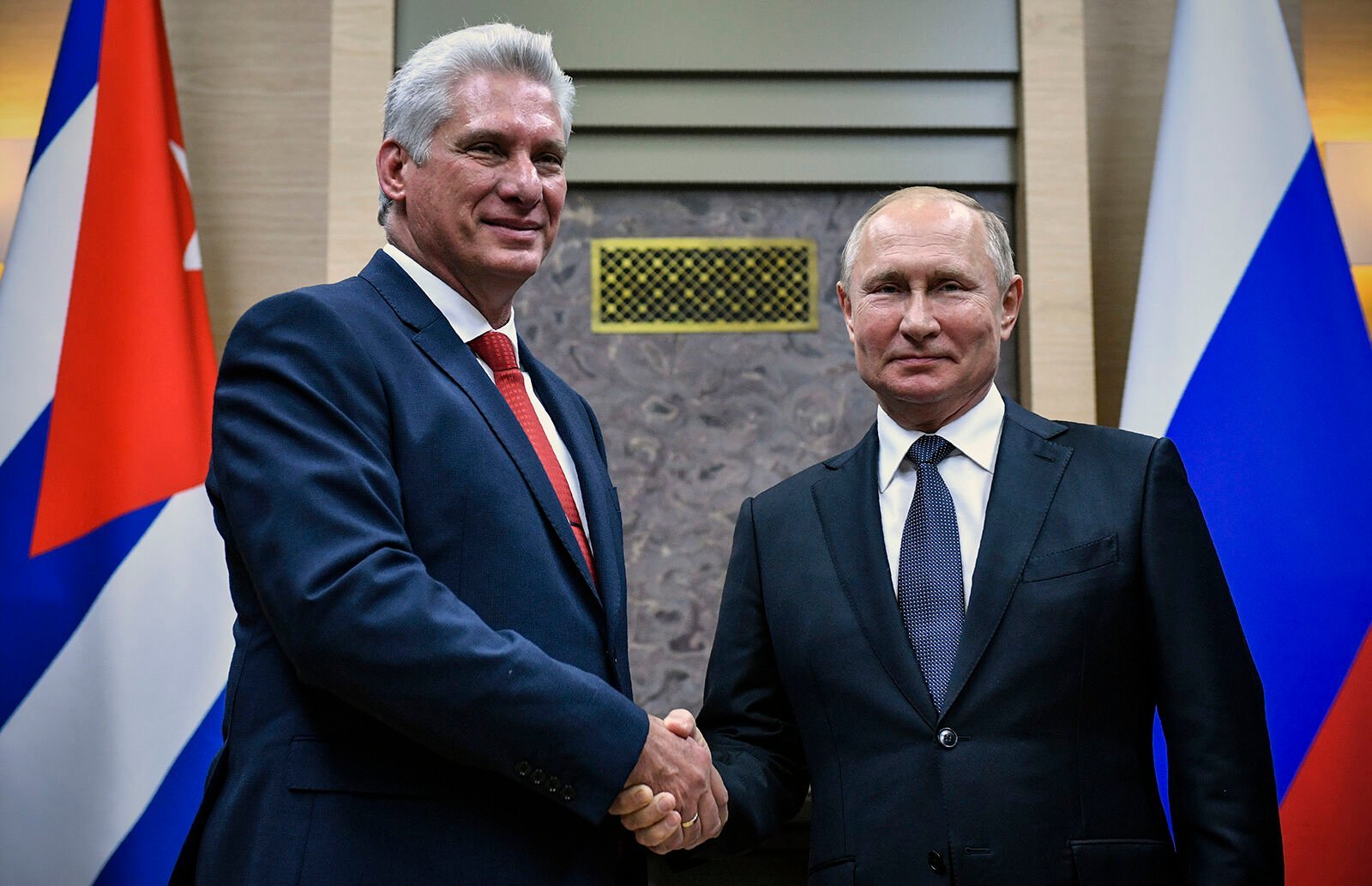Cuba wants Russia’s advice on market reforms
After much hesitation about how to deal with small and medium-size private enterprises it authorized in 2021, the Cuban government is turning to Russia for help with market reforms on the island through a partnership with a Russian think tank headed by sanctioned oligarch Oleg Deripaska, as the two countries vow to take their relationship to “a new level.”

Alexander Nemenov, Pool/AFP via Getty Images
Russian President Vladimir Putin meets with his Cuban counterpart Miguel Diaz-Canel on Oct. 29, 2019, at the Novo-Ogaryovo state residence outside Moscow.
The creation of a Center for Economic Transformation, in partnership with the Moscow-based Stolypin Institute for the Economy of Growth, came during a recent meeting between Cuba’s leader, Miguel Díaz-Canel, and a delegation of Russian officials and businessmen in Havana.
The head of the delegation, Russian politician and champagne company owner Boris Titov, told Russian news outlets Interfax and Sputnik that the institute, under Deripaska’s control as chairman of the board, will help Cuba carry out economic reforms involving the private sector. Deripaska was sanctioned in April 2018 as part of the U.S. response to the Russian government’s annexation of Crimea, Ukraine. He was indicted last September for violating those sanctions.
Titov, whose official title is Commissioner for Entrepreneurs’ Rights, said the aid Russia can provide through the new center includes sharing technological expertise.
“Russia has experience in creating digital systems for companies. Our task is to share with our Cuban friends the digital technologies successfully applied in Russia,” he said.
Titov also told the Russian news agency Tass that his government intends to expand commerce with the island and has proposed opening a Russian “trading house” in Havana in partnership with Cimex, a Cuban government company that is part of the military conglomerate GAESA. Both Cimex and GAESA are under U.S. sanctions.
“The Russian side is now working very hard to take our economic relations (with Cuba) to a new level,” Titov was quoted as saying.
“Our proposal is to create a Russian trading house here, in Havana, with the participation of Cimex, which would become the sole wholesale importer of products and independently determine prices on the retail market. In the coming days, we are expecting a reaction from the Cuban government,” Titov said.
Tass reported that Cuba’s deputy prime minister and foreign trade and investment minister, Rodrigo Malmierca, promised government support for the proposal.
“We are working to ensure that Russian investments in Cuba are subject to special protection,” Malmierca said, according to the report.
After being named head of the Russia-Cuba Business Council earlier this month, Titov told Tass that the two governments were working together to find ways to evade U.S. financial sanctions.
As “both countries are under sanctions, it would be necessary to develop new mechanisms for mutual settlements, which will mitigate the fallout from restrictions,” Titov said at that time. “Such options as ruble-denominated settlements, cryptocurrencies and clearing schemes are being explored.”
Russia and Cuba have been steadily getting closer in the past few years. Vladimir Putin’s government has extended loans to Cuba and offered to delay debt payments till 2027. The two nations have launched cooperation projects in several areas, including energy and transportation.
But the level of political contacts since the beginning of the war in Ukraine last year has increased, with both governments vowing to strengthen the relationship.
Díaz-Canel traveled to Moscow in November and met with Putin, looking for economic aid, as the island experiences the worst economic crisis since the collapse of the Soviet Union. The head of Cuba’s National Assembly, Esteban Lazo, also traveled to Moscow.
Díaz-Canel and Putin talked again on the phone in late December. At the time, the Russian foreign ministry said the two leaders talked about reinforcing the “strategic Russian-Cuban cooperation.”
Trade between the two countries also grew last year, when Cuba ramped up imports of Russian oil. Commercial trade between the two countries was valued at more than $633 million, just behind trade with China, Venezuela, Spain and Canada, according to official Cuban data. Six years earlier, in 2016, that volume was $223 million.
Russia is seeking new markets for its products, especially among countries willing to maintain economic ties despite Western sanctions punishing Putin’s invasion of Ukraine.
Both Russia and Cuba are under U.S. sanctions, and Cuban authorities have parroted the Kremlin’s propaganda about the war in Ukraine while failing to condemn Putin in international forums. The two governments also maintain close military ties.
But experts point to the irony of Cuba’s seeking guidance on capitalist reforms from Russia, a country plagued with corruption and an economy driven by oligarchs seeking the Kremlin’s favors.
“They are seeking help from a government that knows how to make money and create a private sector that has a lot of money concentrated in a few hands, and wealth derives from connectivity to the government,” said John Kavulich, the president of the U.S.-Cuba Trade and Economic Council. “The Russian Federation has some very wealthy people. Perhaps the Cuban government prefers it that way.”
